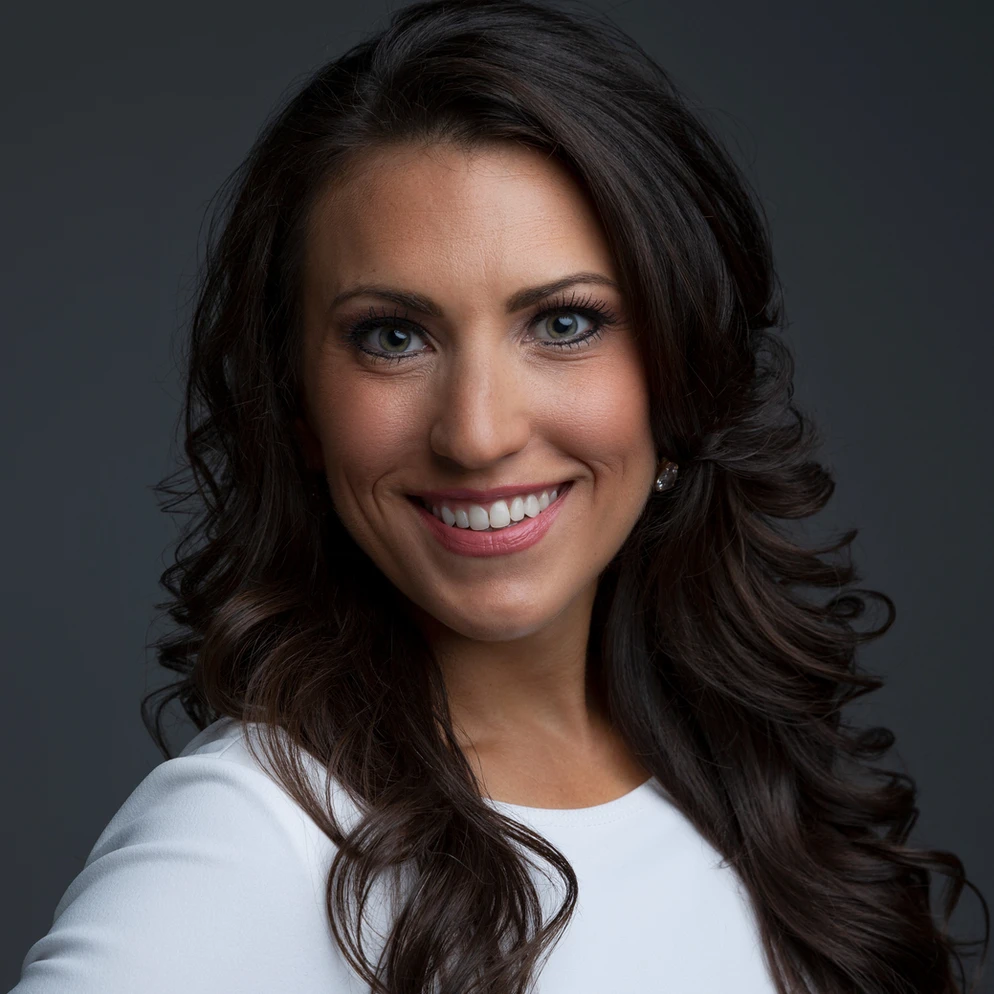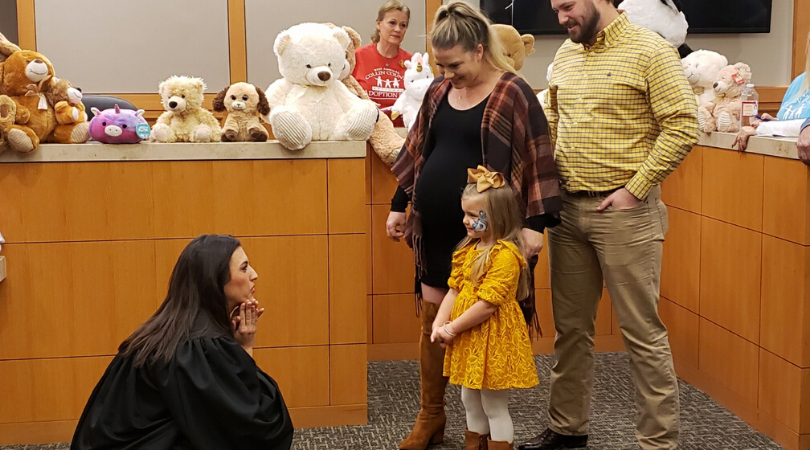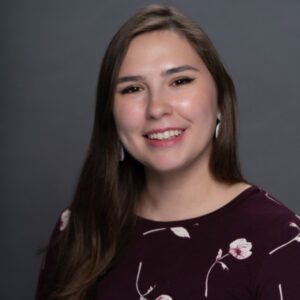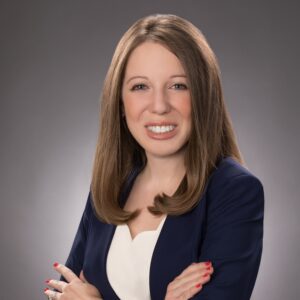
Judge Lindsey Wynne was appointed as a District Court Judge in Collin County in September 2019. But it wasn’t her impressive appointment that provided Lindsey with the greatest satisfaction. Within two weeks of her appointment, Lindsey had a full docket of 1,500 cases that she began hearing on her first day. Over the course of her first five months and with the assistance of her remarkable court staff, she disposed of over 1,400 cases in her court. Not only does Lindsey pride herself in her noticeable efficiency and strong work ethic, but also her commitment to the courtroom and ensuring people’s cases are heard. As a judge hearing family law matters, Lindsey draws from her background as a former family law attorney, as well as a former prosecutor in the crimes against children and juvenile divisions. Judge Wynne served for many years as an advocate to protect, educate, and rehabilitate children, and now, as a Judge, she seeks to uphold the law and ensure children’s best interests are the priority in her courtroom.
Lindsey was raised in the suburb of Cedar Hill, located south of Dallas. While in elementary and middle school, Lindsey recalls the diverse educational programs made available to all students, which were tailored to each student’s individual needs. Lindsey also remembers the vast amount of extracurricular programming aimed at teaching students ‘right from wrong.’ There were violence and gang prevention presentations, D.A.R.E. programs, and organizations aimed at rewarding students for positive behavior and good grades. Lindsey believes it is important to bring these programs to students at an early age, helping students make better choices and giving them hope for their future. After excelling in Cedar Hill’s various academic programs, Lindsey and her family moved to Frisco, a suburb north of Dallas in Collin County, where she attended high school.
While in high school, Lindsey began to tap into her leadership potential. She decided to run for class president. Lindsey jokingly recalls her inspiration to run stemming from the push to have academic letter jackets. She wanted students who did not participate in sports or band to have an opportunity to receive the high school symbol of honor if they excelled academically. As class president, Lindsey also initiated canned food drives and a D.A.R.E. partnership with local elementary schools. It was important for her to be a leader and set an example. While Lindsey did not originally have plans to run for office, her role as class president set her political trajectory.
Lindsey went on to attend The University of Texas in Austin, giving her the platform to intern for a political consulting firm, a news station, and the Texas Senate Education Committee. Due to her work experience with politics, Lindsey was sent to the Democratic and Republican national conventions with the news station to provide research and assistance to the reporters. Throughout high school and college, Lindsey continued to help children by acting as a mentor for area youth and volunteering at Texas Scottish Rite Children’s Hospital, but her passion for helping children really began to take shape with her exposure to the political arena and her developing interest in education policy. This interest became the catalyst for her decision to attend law school.
Upon graduating from the University of Texas Law School, Lindsey moved back to North Texas and began working with the Collin County District Attorney’s office. During her tenure as a prosecutor, Lindsey worked in multiple divisions including the crimes against children and juvenile divisions. Though her role as a prosecutor did not directly impact education policy, Lindsey knew she was positively impacting children through her advocacy for them in the courtroom. Lindsey continued to learn and grow in the D.A.’s office and seek out positions where she could make a greater impact in the community, and in particular, children in the community. After working as a prosecutor for nearly ten years, Lindsey transitioned into the role of a family law attorney. She saw this as a new way to advocate for children and to fight for what was in their best interest at home.
Lindsey knew she wanted to be a judge one day, but did not expect it through an appointment process. She applied for the district court appointment through Governor Greg Abbott’s office after a new court was added in Collin County. It was a strenuous application process, so when Lindsey received the call that she was receiving the appointment, she was thrilled. As an appointed judge, Lindsey took office within weeks of the news. Almost immediately after taking the bench, Lindsey had to begin campaigning for her upcoming primary election in March of 2020 and general election in November of 2020. Appointed officials must campaign and run for office in the next election cycle to serve another term.
As a sitting judge and current candidate, Lindsey upholds a platform of justice, efficiency, transparency, and accessibility to the courtroom. As a trial attorney who prosecuted hundreds of cases before juries and judges, she believes it is important that the fact finder in any trial not allow bias to affect their ability to hear the evidence and follow the laws as written. Lindsey understands the impact of following the laws and ensuring a child’s best interest is the priority in a family law case. With a growing population comes a greater number of legal issues and cases for the courts to hear. Running an efficient courtroom with an available and accessible judge is a priority to Lindsey. She also understands the importance of the growing mental health concerns in our community – for both adults and children. It is important to stay educated on these issues and understand the available family resources in the community aimed at mental health and wellness. Lastly, Lindsey strongly prioritizes education for children and hopes to make an impact in the community when it comes to children’s access and use of the internet. With internet and social media access ever-expanding, she wants to inform children of some of the dangers of the various web-based platforms. She believes that children are not mentally and emotionally ready for some of the material they may encounter on the internet and social media.
Lindsey recognizes that it is difficult to balance time spent as a full-time judge, candidate, mother of two children, and wife to a federal prosecutor. Most of her weekends are packed with family activities and campaign events, so Lindsey has introduced her children to the campaign trail, allowing them to be involved with some of the opportunities. Though there is never a complete balance, Lindsey puts a generous amount of energy into keeping all of these roles running as smoothly as possible.
With the COVID-19 crisis governing day-to-day operations, Lindsey was forced to transform her courtroom into a virtual one. She had to be creative and adaptive. Lindsey is managing a schedule of remote hearings that prioritize the most important family matters such as protective orders, child welfare and CPS matters, and other urgent issues affecting families. Additionally, she is using the power of a statewide emergency order to provide flexible alternatives to hearings, such as written affidavits from litigants, who would otherwise appear in court, to consider by submission. Finally, Lindsey has opened her availability to extended hours and forums, giving people the opportunity to contact her through email, social media, and conference calls. It is important to Lindsey that she continue to remain steady yet flexible in these times of uncertainty.
To learn more about Judge Lindsey Wynne, visit her website at https://judgelindseywynne.com/.





